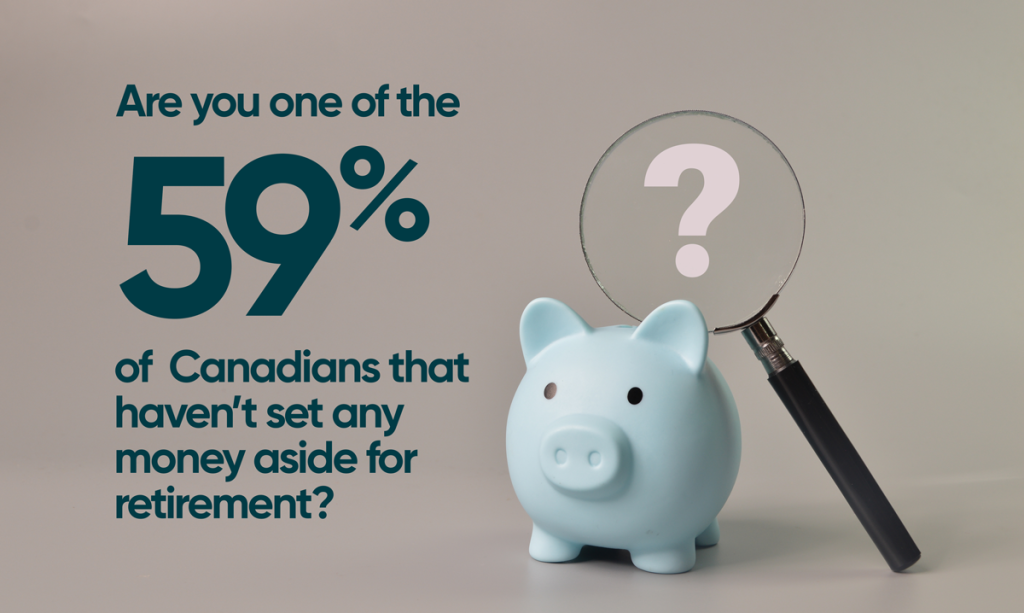How much money should I save for retirement?
‘The best is yet to come!’ If this classic saying holds true, then your retirement is certainly something to look forward to! Leisurely time with family, friends, travel and hobbies await—maybe even a jigsaw puzzle or two!
Planning for retirement can also be a bit puzzling, and ensuring your later years are truly golden will require foresight and financial planning. Luckily, you can lean on the advice and expertise of your ACU financial advisor to help plan your future. It’s never too early—or too late—to start planning a future that’s fun, fulfilling and financially secure!
So, how much do you need to save for retirement?
Retirement jitters? Turn them into confidence.

Millions of Canadians aren’t really sure if their finances are ready for retirement, according to a 2024 survey:
- 58% are worried about having enough money for retirement
- 59% haven’t set any money aside for retirement
- 57% feel unprepared for retirement
If this sounds familiar, don’t worry—you can take control of your own financial situation and get on the right track! Keep reading…
Lay out the pieces of your retirement puzzle
There isn’t one singular consideration that determines how much money you need for retirement. Many factors come into play including:

- Retirement age: If you hope to retire early, for example, you’ll have to map out a longer retirement period to fund. But with the right head start and advance planning, you may be able to retire earlier than you thought. Even a year or two earlier could be possible!
- Continuing to work part-time: Sure, you might want a full-time break after you retire. However, many people return to the workforce in some capacity, or volunteer. Working part-time during retirement means you might not have to save as much money in advance, and could give you a rewarding sense of purpose or accomplishment as you grow older.
- Where you want to retire: Will you stay in your current home, upsize, downsize or rightsize your place? If you have a cabin or vacation property, will that be your golden years retreat full-time? Or will you move to a destination of your dreams? Retiring abroad could be less expensive than living here in Canada, depending on the location. Just be sure to factor in all costs of relocating (including the occasional trip back to visit family and friends).
- Travel plans: Of course, retirement means more free time to get out and explore. Whether it’s visiting friends and family further from home, or tackling your adventure bucket list, you probably have a place or two you’ll want to go. Budget for the average cost of a trip and the number of destinations you want to go per year in order to get a realistic ballpark of your future travel costs.
- Hobbies: Always dreamed of sailing? Excited to hike all of Manitoba’s amazing trails? Want to create a backyard garden oasis? Getting into photography again? Add up the costs of the equipment, memberships, travel costs, etc. and include these in your ongoing budget so you have the freedom to explore those passions!
Find the edges
Consider your mandatory expenses to be the edge pieces of a jigsaw puzzle. Once those are in place, you have your framework. Now you can have fun completing the puzzle!
Major expenses you might incur after retirement will also affect how much you need to save beforehand. While some living expenses could increase—like travel or medical prescriptions—others will dip, such as eliminating childcare, camp fees and regular commuting costs.
For example, consider key expenses such as:
- Mortgage or rent: If you sell your home before retiring, you will still need somewhere to live. How much will that cost? If you don’t pay off your mortgage before retiring, how much will the monthly payments and interest cost you?
- Credit cards, loans and other debt: Some of these will be more predictable, such as loans, but others can fluctuate depending on spending habits or impulse buying. Try to limit as much debt as possible before retirement, and then work with your financial advisor on a plan to manage any debt during your golden years.
- Assisted living, home care or long-term care: A long happy life is a great blessing, and many Canadians are now living into their nineties and beyond. That means we also need to plan for the eventual costs of in-home caregivers, nursing homes or similar aid. Nobody likes to think about it, but it’s best to be prepared for comfort and support in the future.
- Supporting family members: Whether it’s your aging parents, siblings, children or grandchildren, there could be costs to consider beyond your own. According to a recent 2024 study, 59% of Canadian retirees are still providing some kind of financial support for their adult, non-student children, ranging from daily living costs to larger expenses like weddings and home purchases.
Tip: Don’t forget about inflation. If you calculate one of your retirement expenses to cost $50,000 today, 20 years from now it will cost nearly $82,000 once you account for an average inflation rate of 2.5% per year.
Complete the inside in sections
Now’s the time to make this puzzle come to life! Estimate the income you’ll earn in the future so you can cover all those expenses (with a little extra to spare) and kick up your feet.
In addition to your savings, you may draw income from sources such as:
- Workplace pension plan: This can be a major source of income that you’ve worked hard over the years to earn. Understand the rules of your pension plan, including all the fine print, so you know exactly what to expect.
- RRSPs, TFSAs or other investments: Depending on your investment strategy, age and other variables, you’ll be able to use the wealth you’ve accumulated in these accounts wisely. Consult your financial advisor to determine how much you can expect to draw from each account, including the optimal timing.
- Registered Retirement Income Fund (RRIF): Draw down your RRSP in a tax-efficient manner with an RRIF. You can withdraw funds from an RRIF as you need them, spreading the income tax you pay over your retirement instead of paying a big chunk of it up front. (Best of all, you won’t pay any income tax on the money that’s still inside your RRIF.) Get all the details here.
- Government programs: You may also be eligible and entitled to receive funds from programs such as the Canada Pension Plan (CPP), Old Age Security (OAS) or Guaranteed Income Supplement (GIS).
- Part-time jobs or freelance positions: As mentioned, many retirees get back into the workforce. You may decide to work in a similar industry as before or switch it up and try something completely new. In addition to topping up your income, working is a nice opportunity to meet new people and have great new experiences.
Puzzle master: Retirement calculators
With today’s technology, there are great tools to help with retirement math, including retirement calculators. These are apps or web pages where you input data about your current situation and your projected future situation after retirement.
- Current information: age, income, savings, investments and expenses.
- Future retirement factors: pensions, government benefits, expenses, debt payments, other financial obligations and the age you want to retire.
The calculator automatically computes the impact of inflation on your savings, investments and expenses over time, and then crunches all the numbers. Bear in mind that while calculators are a handy way to get the ball rolling, they only offer an estimate and are not a complete retirement savings plan. They provide an estimate on:
- how much money you’ll need to live comfortably during each year of retirement
- whether you’ll have enough money, a surplus or a shortfall
Take this as an opportunity to adjust your plan. That might mean changing your retirement age, reducing your current living expenses or finding ways to increase your income. You may also want to retool your budget (for example, exploring whether you should put more towards retirement savings or reduce debt), boost your RRSP contributions or rightsize your retirement expectations.
Whatever the result, simply getting an idea of where you stand will help you prepare for your financial future.

ACU’s retirement calculator is a great place to start.
Interlock retirement with other goals
Though saving for retirement is important, it must be balanced with your other financial goals and obligations before you retire, such as helping your children through post-secondary studies or paying off your mortgage. You can’t funnel too much of your financial resources into future retirement at the expense of pressing financial needs now.
Money should also be allocated for an emergency fund for surprises like urgent car and home repairs. Following a budget is one way to balance your current financial needs with saving for retirement. One example is the 70/20/10 budget:
- 70% of after-tax income covers living expenses
- 20% is set aside for investments, emergency funds and savings (including for retirement)
- 10% goes to debt repayment
While this is just one template to explore, your financial advisor can work with you to help budget for your unique retirement needs.
Don’t lose the last piece!

After retirement, how do you make sure you don’t spend your nest egg too quickly? Here are some quick tips:
- The 4% rule: Withdraw only 4% of your retirement savings during each year of retirement, adjusting annually for inflation.
- Delay CPP or OAS: Collecting these at age 70 vs. 65 could help your retirement savings last longer. However, consult an expert about tax implications.
- Invest in GICs: GICs are typically offered at terms of one to five years. You’re guaranteed to get your original investment back (plus interest at a locked-in rate) if you don’t withdraw your money before the term ends. Plus, if you save for retirement by putting a GIC in a registered account like a TFSA, RRSP or RRIF, your returns are tax-free. Here’s how GICs, in particular, can help your savings last longer after retirement:
- GICs are protected from market volatility and earn guaranteed interest
- The penalty for withdrawing from a GIC before it matures is a great incentive to resist dipping into your nest egg
- Laddering GICs (buying multiple GICs that mature at staggered intervals) can provide a predictable, guaranteed income flow during retirement.
While retirement planning may seem like a puzzle, all the pieces are ready for you to spring into action. View this puzzle as an opportunity to identify what matters most to you, set goals for the future and create a roadmap for making your dreams a reality.
Make an appointment with an ACU financial advisor today to get help mapping out your retirement plan.
Up Next
Celebrating the 10th anniversary of student-run credit union
Just over 10 years ago, a survey circulated at Winnipeg’s Technical Vocational High School. The results showed that students at the school, commonly known as Tec Voc, felt short-changed—they were…
Kilter Brewing Co. serves up craft beer and community connection in St. Boniface
Deep in the heart of St. Boniface, Kilter Brewing Company is a hidden treasure—an oasis for Winnipeggers to escape their day-to-day routines, enjoy craft beer and connect with their community….
How to use a mortgage calculator to budget better
Learn how to use ACU’s mortgage calculator to figure out how much mortgage you can afford, and what budget you should set before you start house hunting. A mortgage lender…







